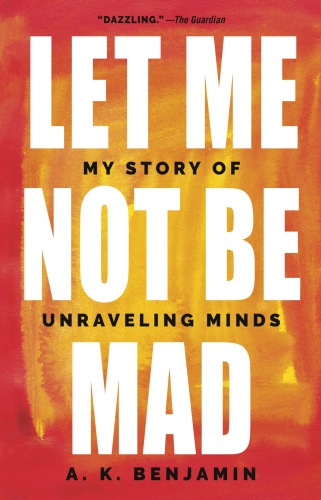
Let Me Not Be Mad
My Story of Unraveling Minds
داستان من در مورد هزینههای سفر
کتاب های مرتبط
- اطلاعات
- نقد و بررسی
- دیدگاه کاربران
نقد و بررسی

May 15, 2019
"Can you have a breakdown in a breakdown?" Clinical neuropsychologist Benjamin delivers tales of disturbed minds--not least of them his own. Listen, assess, prescribe: It's a process that every psychiatrist follows, sometimes countless times in the course of a working year. But what is that doctor hearing? "Studies have shown that your generation, our generation, lies on average two or three times every ten minutes, men to make themselves look better, women to feel good," writes the author. So how much of the assessment is built on untruths, and how much on observable reality? As Benjamin notes, an average one may contain 100 mistruths, depending on what and how much the patient chooses to reveal. Some of the cases that present themselves to the author are sufferers from dementia, which itself can hide behind misrepresentations, as he recounts when trying to attend to his own mother, "a mother and son mirroring each other's confusion." Others are grandiose, delusional, even dangerous. As Benjamin observes, attempts to help are often of the blind-men-and-elephant variety, with different specialists often coming to very different conclusions about a single patient--the oncologist looking for the brain tumor, the psychologist looking for the moment of fracture in a person's history, and so forth. Given all this, the author ironically proposes an entry in the diagnostician's manual for a syndrome named after himself, one that describes "an obsession with the singularity of your diagnosis while fearing that any specific diagnosis is too narrow." So it's small wonder that so many mental health workers suffer from plaguing doubts and maladies of their own, alleviated, perhaps, by the thought that "however sick, however mad, there would always be someone worse in need of looking after." A well-conceived and -written exploration of the traps hidden in the art of mental healing.
COPYRIGHT(2019) Kirkus Reviews, ALL RIGHTS RESERVED.

June 7, 2019
One should usually proceed with caution and a dose of skepticism before accepting authors' assertions that their book offers readers everything. But that is clearly not the case here. Publishing expert, prolific author (e.g., Effective Business and Nonfiction Writing; Career Opportunities in the Publishing World), and Hannacroix Creek Books founder Yager has produced this compendium that covers in detail every major step for would-be writers to follow on their path to publishing. Part 1 concentrates on writing and preparing a manuscript for publication, including advice on editing and proofreading. Part 2 focuses on cover design, text design, creating an ebook, printing, and conversion to an audiobook. Part 3 involves marketing, publicity, and selling the work. Yager provides helpful tips for the novice to avoid being taken advantage of by the many publishing services out there and gives what she calls the "normal range" of fees to expect. There is also an extensive list of resources. VERDICT With self-publishing an increasingly common option for writers today, it would be hard to imagine a more useful and easy-to-follow guide than this comprehensive volume. Highly recommended to everyone hoping to self-publish a book that won't look self-published.--Edward B. Cone, New York
Copyright 2019 Library Journal, LLC Used with permission.

June 7, 2019
Clinical neuropsychologist Benjamin explores the relationship between doctor and patient, writing about the various patients he met during the ten years he worked in a London hospital. The author begins with a series of case studies describing the neurological challenges his patients face, such as traumatic brain injury, severe epilepsy, and a host of other neurodegenerative diseases. This literary format, made familiar by Oliver Sacks, soon diverges as Benjamin incorporates more of his own trials and tribulations. With each chapter readers are left wondering who is more in need of diagnosis and medical support--the person on the examining table or the professional asking the questions--as Benjamin blurs the line (a thin and almost nonexistent boundary in his case) between doctor and patient. Benjamin's narrative is erudite, at times lofty, and almost always on the edge of painful as he illuminates his fraught world. VERDICT This unique memoir will likely appeal to fans of personal medical writing and narratives.--Ragan O'Malley, Saint Ann's Sch., Brooklyn
Copyright 2019 Library Journal, LLC Used with permission.

























دیدگاه کاربران